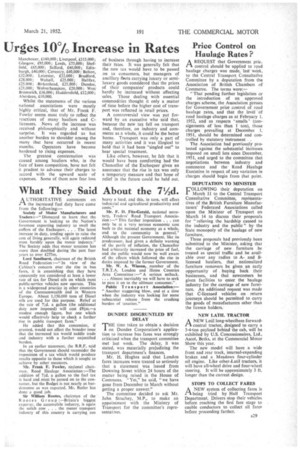Urges 10% Increase in Rates
Page 31

If you've noticed an error in this article please click here to report it so we can fix it.
Manchester, £140,000; Liverpool, 015,000 ; Glasgow, £95,000; Leeds, £75,000; Sheffield, £65,000; Salford, £40,000; Edinburgh, £40,000; Coventry, £40,000; Bolton, £32,000; Leicester, £32,000; Bradford, £28,000; Walsall, £25,000; Halifax, £25,000; .Birkenhead, £25,000; Dundee, £21,000; Wolverhampton, £20,000; West Bromwich, £16,000.; Huddersfield, £12,000; Aberdeen, £10,000.
Whilst the statements of the various national associations were mostly highly critical, that of Mr. Frank F. Fowler seems most truly to reflect the reactions of many hauliers and Clicensees. News of the increase was received philosophically and without surprise. It was regarded as but another burden to shoulder among the many that have occurred in recent months. Operators have become hardened to rising expenses.
The greatest consternation was caused among hauliers who, in the face of keen competition, have not felt it prudent to advance their charges to accord with the upward scale of expenses. Some of them now fear loss
of business through having to increase their rates. It was generally felt that the new tax would have to be passed on to consumers, but managers of ancillary fleets carrying luxury or semiluxury goods considered that the prices of their companies' products could hardly be increased without affecting sales. Those dealing with essential commodities thought it only a matter of time before the higher cost of transport was reflected in retail prices.
A controversial view was put forward by an executive who said that, because the new tax fell on transport and, therefore, on industry and commerce as a whole, it could be the. better borne. Transport was only a part of many activities and it was illogical to hold that it had been "singled out" to bear special treatment.
Like others, however, he felt that it would have been comforting had the Chancellor of the Exchequer given an assurance that the rise in tax was only a temporary measure and that hope of relief in the future could be held out.




















































































